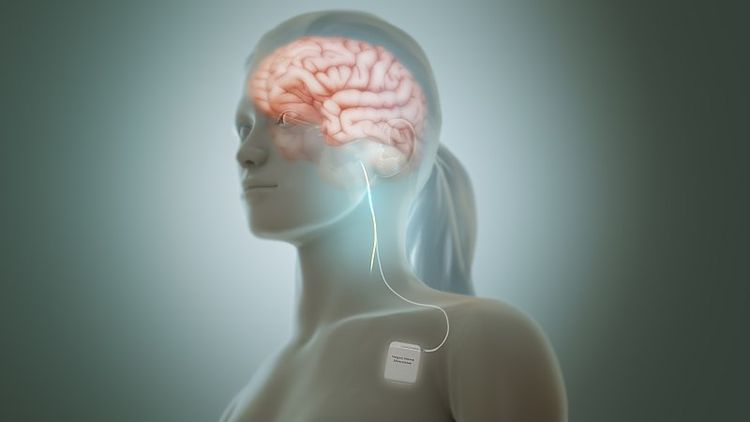The Importance Of The Vagus Nerve And How To Optimize It
What happens in Vegas should apparently stay in Vegas. But what happens in the vagus nerve impacts the rest of your body. The vagus nerve plays a very important role in our everyday functioning as humans. Also known as cranial nerve 10, or CN X, it’s the longest of all the cranial nerves. Sort of like a “vagabond nerve,” it meanders all throughout the body, and has the unique distinction of communicating sensory and motor impulses to every single organ. There’s been an increase in interest in the vagus nerve recently due to its suspected role in decreasing chronic inflammation within the body…

The Nitty Gritty
The autonomic nervous system is a branch of the peripheral nervous system that regulates internal organ function. Organs like the heart, stomach, kidneys, and liver – all the organs that are controlled unconsciously.
The function of these organs is very dependent on the state of the body at the time. Depending on whether the body is in a relaxed state or a very energetic or stressed state, certain organs are functioning harder or easier. This activity is controlled by the autonomic nervous system. The two divisions of the autonomic nervous system have very different effects on the organs they serve.
Sympathetic Nervous System
This portion of the autonomic system is responsible for the “fight-or-flight” reaction; the survival mode, or emergency operating system. It ramps up heart rate, breathing rate and depth, increases pupil dilation, sends blood to muscles in the extremities, and draws blood away from the digestive system and liver. All of this is done in order to save a person’s life when they’re in a threatening situation.
Parasympathetic Nervous System
This system is often referred to as the “rest-and-digest” system. It allows the body to go into a relaxation and recovery state. Thus, it decreases heart rate, causes the body to take deeper breaths, and pulls blood toward the digestive and reproductive organs to promote nutrient absorption and recovery.
The parasympathetic system is primarily operated by the vagus nerve. Due to its intricate and thorough innervation of multiple organs, if the function of the vagus nerve is interrupted, it can cause multiple health problems and disease patterns.
Chronic Stress
Current lifestyle pressures and choices cause many people to be living in a perpetual state of stress. Always rushing, being too busy, and trying to meet deadlines taxes the sympathetic nervous system unduly, causing long-term damage to organs like the heart and adrenal glands. This also leads to high levels of inflammation within the body. With this in mind, it’s imperative for people to consciously focus on activating the parasympathetic system to promote the rejuvenation and relaxation of the body.

Vagus Nerve Stimulation
Deep Breathing Exercises
Consciously slowing the breath, deepening inhalations, and lengthening exhalations promotes dominance of the parasympathetic system by improving vagal tone and affecting heart rate variability.
Yoga
Along with deep breathing, yoga goes hand-in-hand with activating parasympathetic responses. Research has shown that regular yoga leads to significant improvements in mood and anxiety levels. As an added bonus, yoga also promotes focus on proper posture, which can also help with health and longevity.
Laughter
The saying “laughter is the best medicine” is well known for a reason. Studies show that laughter increases the relaxation response promoted by the vagus nerve, as well as decreasing heart rate.
Humming, Singing, Chanting
Heart rate variability is a measure of the balance in the parasympathetic system. It increases relaxation and decreases heart rate via the vagus nerve. Singing, chanting, and humming have all been shown to increase heart rate variability by creating a pulsating activity within the vagus nerve.
Cold Showers
Thinking about cold showers may not produce thoughts of relaxation, but the initial sympathetic jolt caused by a cold shower is quickly replaced by parasympathetic activity as the vagus nerve kicks into action, causing the body to acclimatize to the temperature.
Acupuncture
Acupuncture has been shown to influence vagus nerve stimulation both directly and indirectly by activating certain reflex systems. Its neuromodulatory effects help balance out autonomic nervous system activity.
Pulsed Electromagnetic Field Therapy
One study has shown that the vagus nerve is capable of being stimulated by magnetic fields, or PEMF therapy. The therapy works to increase heart rate variability, promoting relaxation and rejuvenation.
These are just a few ways that people can promote parasympathetic activity and thus, longevity and improved overall health. Essentially, any activity that causes the participant to feel relaxed can help to stimulate the vagus nerve; it’s just a matter of consciously adding these activities into everyday life. It’s okay to rest and relax. In fact, it’s actually good for your health.
